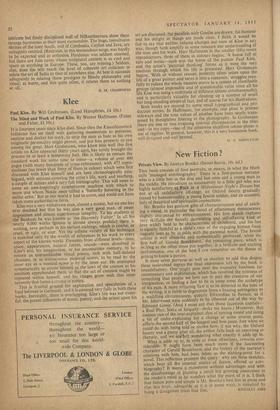Private View. By Jocelyn Brooke. (James Barrie, 10s. 6d.) THIS
book consists of four portraits, or essays, in what the blurb calls 'managed autobiography.' There is a first-person narrator wilt) is a little boy in the first and last ones and a young man in the middle. He introduces us successively to a little girl who was highly satisfactory as Puck in A Midsummer Night's Dream but not at all satisfactory off-stage, an Oxford hearty gradually ruined by homosexuality, a young Jewish soldier, and an eccentric lady of theatrical and spiritualist connections. Mr. Brooke has genuine gifts of characterisation and of catch- ing a mood, in particular the mood of affectionate reminiscence slightly sharpened by embarrassment. His first sketch captures very skilfully the fiercely demanding and self-effacing kind of dove widely held to be characteristic of childhood, and his last is equally faithful to a child's view of the engaging human freak vaguely seen to be at odds with the parental world. The Jewish' soldier is well olieetied and economically portrayed, while the first half of 'Gerall -Brockhurst,' the remaining piece, which is as long as the other three put together, is a brilliant and exciting performance, one of the best I can remember on the theme of getting to know a person.
It must seem perverse as well as churlish to add that despite these undoubted merits the final impression left by the book is unsatisfactory. One might pass over the excessive fondness for commentary and explanation, which has involved the triteness of remarking that people we love are in part the creatures of our imagination, or finding a Jew to be in some sense the archetype of his race. A more irritating flaw is to be detected in the tone of the writing; it is liable to degenerate from a bracing astringency to a waddling circuitousness, queerly Edwardian in flavour, as if Mr. Isherwood were suddenly to be elbowed out of the way by Edmund Gosse. (And I must say that those facetious capitals-- a Real Play, Sinks of Iniquity—make me heave.) Moreover, that curious vice of the over-explainer, that of turning round and doing a bit of under-explaining for a change at some crucial point, afflicts the second half of the longest and best piece. Just when we could do with being told or shown how, if not why, the Oxford hearty was a pansy after all, the author falls back on reporting or rhetoric, and we araleft wondering what exactly it adds up to.


































 Previous page
Previous page